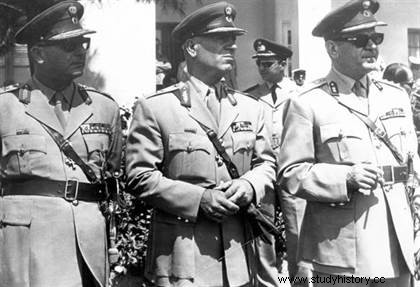 On April 21, 1967, a group of Greek colonels , with Georgios Papadopoulos at their head, organizes a coup against the interim government of Panayote Canellopoulos. The military junta establishes a regime of terror, issues a series of decrees abolishing most civil liberties, imposing censorship on the media, suppressing political parties and many organizations. The new power is supported by the United States, due to Greece's strategic position in the Mediterranean geopolitical balance at the time of the Cold War. The ultra-nationalist drift of the dictatorship of the colonels , will however cause its fall during the Cyprus Crisis.
On April 21, 1967, a group of Greek colonels , with Georgios Papadopoulos at their head, organizes a coup against the interim government of Panayote Canellopoulos. The military junta establishes a regime of terror, issues a series of decrees abolishing most civil liberties, imposing censorship on the media, suppressing political parties and many organizations. The new power is supported by the United States, due to Greece's strategic position in the Mediterranean geopolitical balance at the time of the Cold War. The ultra-nationalist drift of the dictatorship of the colonels , will however cause its fall during the Cyprus Crisis.
Greek democracy weakened by political instability
April 1967. Greece has been experiencing an unstable political situation for four years. The 1963 elections (the country's first free elections in nearly forty years) had brought to power Georges Papandreou, an old opponent of the hard right. The latter had tried to purge the army of its most right-wing elements, before being dismissed by King Constantine II. Papandreou's dismissal led to growing governmental instability. The latter, combined with social difficulties, largely benefited the left, which was very critical of the country's pro-American alignment.  The army, scalded by increasingly frequent demonstrations, eventually came to the conclusion that the young king Constantine is unable to maintain order in the country. On April 21, 1967 a group of colonels ambitious led by Georges Papadopoulos takes action, and taking advantage of the inertia of the monarchy, seizes power and abolishes the constitution. It is rumored that the colonels had the support of American intelligence services, worried about a possible socialist revolution in Greece.
The army, scalded by increasingly frequent demonstrations, eventually came to the conclusion that the young king Constantine is unable to maintain order in the country. On April 21, 1967 a group of colonels ambitious led by Georges Papadopoulos takes action, and taking advantage of the inertia of the monarchy, seizes power and abolishes the constitution. It is rumored that the colonels had the support of American intelligence services, worried about a possible socialist revolution in Greece.
The 1967 putsch and the dictatorship of the colonels
In the weeks that followed, the country was brutally brought into line, opponents were systematically arrested or even tortured, some deported to islands in the Aegean Sea. Several thousand political figures, in particular leftists and communists, artists and writers were thus arrested. The military junta establishes a regime of terror, issues a series of decrees abolishing most civil liberties, imposing censorship on the media, suppressing political parties and many organizations.
 Having failed in his attempt to overthrow the junta in December, King Constantine went into exile in Italy; the regency is attributed to General Zoïtakis. However, the opposition manifests itself with virulence. On March 15, 1968, Papadopoulos retaliated by presenting the preliminary draft of a new Constitution, which strengthened executive power and limited individual freedoms. It is subsequently revised and ratified by a popular referendum in September. The dictatorship which quickly becomes very unpopular will sink into a nationalist and xenophobic escalation which is reminiscent of that of the dictator Metaxas in the 1930s.
Having failed in his attempt to overthrow the junta in December, King Constantine went into exile in Italy; the regency is attributed to General Zoïtakis. However, the opposition manifests itself with virulence. On March 15, 1968, Papadopoulos retaliated by presenting the preliminary draft of a new Constitution, which strengthened executive power and limited individual freedoms. It is subsequently revised and ratified by a popular referendum in September. The dictatorship which quickly becomes very unpopular will sink into a nationalist and xenophobic escalation which is reminiscent of that of the dictator Metaxas in the 1930s.
The return of democracy
The power of the military is further weakened by the Cyprus crisis. Indeed, the colonels' regime decides to support the coup d'etat which overthrows the Cypriot head of state, Makarios III. In response and as tensions grew between the Greek and Turkish communities, the Turkish government invaded the island, resulting in the partition of the territory. Greece mobilizes its troops, but, following pressure from the United States, it gives up intervening. From then on, the fate of the military junta was sealed. In June 1974, she had to retire.
After an election in November 1967, Constantin Karamanlis, leader of the New Democracy party, forms a new government and organizes a referendum which is favorable to the establishment of a republic . A new constitution establishing a democratic regime was approved in June 1975.
To go further
- History of modern Greece 1828-2012, by Nicolas Bloudanis. The Harmattan, 2013. -
